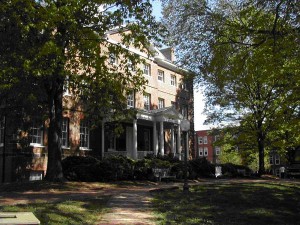Visiting Colleges? 0
Looking Beyond the College Brochures
If you are serious about going to college, then you need to look beyond those expensive, glossy, full-color college brochures or fancy websites that tout the institution’s image and credentials.
Have you ever noticed that a lot of schools seem to have similar characteristics? … They are located in sun-drenched communities where clouds are rare… Classes are small and seminar-like and held on lush, green lawns… A beautiful lake is the visual center of most campuses; ducks and geese abound… It is fall year-round.
Don’t judge a college by its brochure. You must gather first-hand intelligence about the schools on your list. Summertime is the second-best time* for all you high school students planning to visit colleges.
The most important source of information about a college is the personal impression you receive from visiting the campus. Personal visits are very important. Unless you actually visit, you’ll never know what it’s like to be there. Selecting and ultimately attending a college is one of the more significant milestone steps you will take; with over a million students starting college every fall, the campus visit is a serious business.
However, most visits fall far short of their potential. This is because prospective students and parents don’t ask the right questions and they end up settling for the information that institutions routinely provide. Does it really matter how many books are in the library (after all, how many can anyone student read?) Or how many faculty members have Ph.D.s? By the way, that degree says nothing about their ability to teach. Students can be surrounded by impressive resources, but not use them, or rarely encounter classes or other activities that truly lead to the skills and competencies they need to survive and thrive after college.
Many research studies show that what matters most to a high-quality undergraduate experience is whether students engage in a variety of educationally sound activities, inside and outside the classroom. The more students study a subject, the more they learn about it. Likewise, the more students practice and get feedback on their writing, analyzing, or problem-solving, the more adept they become. And the more experience they have with people from different backgrounds, the more sensitive, comfortable, and effective they will be when working with such people. Simply put, the more engaging the college, the more students learn.
Not surprisingly, students hear almost nothing about learning when they visit campuses. But they can find out by asking certain questions of tour guides, admissions staff, faculty members, and currently enrolled students. Answers to the following questions will reveal things about a college that you may never discover otherwise:
- Is true critical thinking encouraged in the classroom? (Learn what critical thinking is before you ask this. If you are a student client of ours, read the “Introduction to Critical Thinking” in your personal college binder.)
- How accessible are faculty members outside of class?
- Are students encouraged to work together to solve problems or work on projects?
- In what ways is information technology and AI used in the classroom?
- How does the college help students learn about different cultures and perspectives?
- Are there recent graduates or current students who can answer questions from prospective students?
- How many students apply what they are learning in class to real-life settings through internships and community service? Are there any academic departments that offer cooperative learning experiences instead of internships?
- After researching the availability of college-based merit scholarships ask about specific scholarships by name and if there is a limit on how many are awarded or if the criteria for qualification is going to be changed?
- Does the college require some sort of senior thesis to encapsulate what one has learned during college?
As I mentioned above, the summer is the second-best time* to visit colleges, and asking the right questions can reveal matters of substance and style that reflect the educational quality of a college. The answers will give students a more realistic basis on which to compare institutions. It is well worth the effort to prepare.
* The best time to visit colleges is during the junior year when classes are in session at the college. Most importantly, prior to visiting, visit the college online using the AAA method I have shown many of you. Collect information from all three departments below.
Admissions
Academics
Advising
All the best success in your pre-college research,
Eric Goodhart ~ help@ SmartCollegePlanning.org or (978) 820-1295


